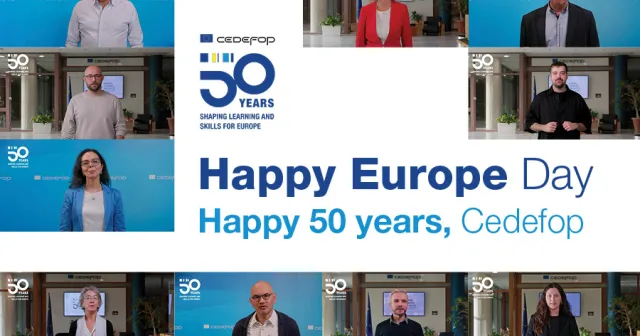Upskilling workers for an AI-powered future

The topic of artificial intelligence (AI) has reached the general public at the latest with the free availability of LLMs. Awareness of the relevance of AI has been growing in companies for much longer. AI is enabling new production processes that are much more machine driven, increasing efficiency in logistics, and also significantly changing the information base and tools for most services. However, the extent to which these technologies will fundamentally change the world of work and the impact on the labour market is controversial. Although it is relatively clear which individual activities could be taken over by AI in the future, it is ultimately up to companies and customers to decide where they want to make use of these possibilities. First, however, it is important to understand what AI can do now and will be able to do in the near future. In order to be able to assess this, companies need their employees, or at least some of them, to have the appropriate know-how. AI-related basic knowledge can be integrated into vocational training and study programmes, or passed on to existing employees through further training courses.
Situation of small and medium-sized companies
Large companies have long since adapted to the use of AI and are testing future-proof work processes that use AI in various forms (robotics or machine learning) and therefore place different demands on the human workforce. The use of AI is also a key future topic for small and medium-sized enterprises, but they often lack specialists who can assess the possibilities of AI for their field of activity and provide the corresponding development impulses. Providing employees with the necessary skills is also an important concern from the companies' point of view (Ulrich & Frank, 2021), but cannot be achieved by them alone. It is not just a question of pure AI specialists, whose employment would hardly be financially viable for smaller companies and does not currently appear to be profitable, but of preparing skilled workers in the company for the use of AI. In order to be able to react promptly to the very rapid developments in the field of AI, qualification strategies are needed that address both future and current specialists. The project KI B³ - Bringing artificial intelligence into vocational training (FKZ: 21IV005F), funded by the German Federal Ministry of Education and Research, has therefore developed and tested both an additional module for trainees and various training formats for experienced specialists (Achtenhagen et al., 2024).
Content and priorities from the perspective of the various stakeholders
Since such additional qualifications and training must be limited in scope, a key challenge lies in selecting content from the vast field of AI knowledge. In the KI B³ project, AI experts from the University of Stuttgart were responsible for the didactically meaningful structure of a curriculum, but at the same time the interests and suggestions of the teachers and trainees involved had to be taken into account. Teachers at vocational schools were therefore interviewed and trainees were questioned in an online survey. Both groups emphasise the importance of a general basic knowledge of AI, with specific application areas and examples, as well as the topic of data analysis, the limits of AI and the ethical issues associated with AI. Trainees also consider the topic of machine learning to be particularly important (Rott et al., 2024). Accordingly, these topics were included as key content in the training courses, which were delivered as blended learning courses in vocational schools and through further education providers. The evaluation of these courses showed a clear learning success and a high level of satisfaction with the content and didactic design. The importance of the accompanying face-to-face meetings was particularly emphasised. The right balance between basic knowledge and concrete application examples and exercises in the learning opportunities also proved to be critical for success (see also Petridou & Lao, 2024). Trainees were critical of the lack of concrete application examples.
However, AI tools were not only the subject of learning but were also used to design the learning environments. Among other things, a chatbot was developed for this purpose, which was able to answer learners' questions about the contents and topics of the course. Initial results indicate a high level of acceptance of the chatbot, although its use is still cautious. It is likely that learners need to get used to the proactive use of such AI tools and internalise them as an available resource.
Challenges
The criticism of the lack of reference to (their own) professional practice, which emerged in the research, reveals a key challenge. The fact that the training courses were offered through vocational schools and training providers meant that there was a lack of direct involvement in the learners' everyday working life. This would require a greater involvement of the companies or the respective supervisors or trainers in the training activities. An alternative could be so-called learning factories, which simulate production and working conditions that have not yet been implemented in the respective companies (Merkel et al., 2017).
So far, the offer has mainly been taken up by particularly able apprentices and skilled workers. However, the high degree of self-direction required of learners in a virtual learning environment, as well as the demanding content of the course, could quickly overwhelm weaker learners. A recently launched project is investigating how AI can be used in the learning environment to support this target group in particular. Another particular challenge is the ethical issues and privacy restrictions that place strict limits on adaptive and personalised learning strategies.
References
Rott, K. J., Lao, L., Petridou, E. & Schmidt-Hertha, B. (2022). Needs and requirements for an additional AI qualification during dual vocational training: results from studies of apprentices and teachers. Computers and Education: Artificial Intelligence, 2022, 100102. https://doi.org/10.1016/j.caeai.2022.100102
Merkel, L., Atug, J., Merhar, L., Schultz, C., Braunreuther, S., & Reinhart, G. (2017). Teaching smart production: An insight into the learning factory for cyber-physical production systems (lvp). Procedia Manufacturing 9, 269 -274. https://doi.org/10.1016/j.promfg.2017.04.034
Ulrich, P. & Frank, V. (2021). Relevance and adoption of AI technologies in German SMEs - results from survey-based research. Procedia Compututer Science 192, 2152-2159, https://doi.org/10.1016/j.procs.2021.08.228
Achtenhagen, C., Rott, K. J. & Zühlke, A. (2024). Die Entwicklung von neuen Bildungsabschlüssen. Ein Making-of aus dem InnoVET-Projekt KI B³. berufsbildung. Zeitschrift für Theorie-Praxis-Dialog 78(2), 21-25. 10.3278/BB2402W007
Petridou, E., & Lao, L. (2024). Identifying challenges and best practices for implementing AI additional qualifications in vocational and continuing education: a mixed methods analysis. International Journal of Lifelong Education43(4), 385–400. https://doi.org/10.1080/02601370.2024.2351076
Biographical note
Dr. Bernhard Schmidt-Hertha is a full professor of General Education and Educational Research in (Germany). His main areas of research are learning in later life, transitions, vocational education, drop-outs, or digital media in education. He is co-editor of three academic journals and is a member of the steering board of the German Educational Research Association. In 2009 he launched the European Network on Education and Learning of Older Adults (ELOA) which is still active





Comments